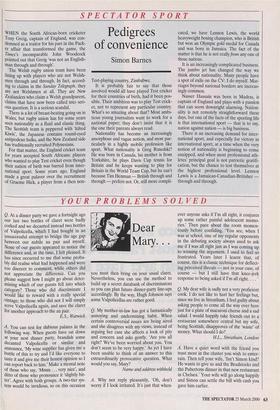SPECTATOR SPORT
Pedigrees of convenience
Simon Barnes
WHEN the South African-born cricketer Tony Greig, captain of England, was con- demned as a traitor for his part in the Pack- er affair that transformed the game, the Times's incomparable John Woodcock pointed out that Greig 'was not an English- man through and through'.
The Welsh rugby union team have been lining up with players who are not Welsh- men through and through. In fact, accord- ing to claims in the Sunday Telegraph, they are not Welshmen at all. They are New Zealanders who claim a Welsh grandparent, claims that have now been called into seri- ous question. It is a serious scandal.
There is a lot of breast-beating going on in Wales, but rugby union has for some years seen nationality as a fluid and elastic thing. The Scottish team is peppered with 'kilted Kiwis', the Japanese contains round-eyed antipodean hulks, and the New Zealand side has traditionally recruited Polynesians.
For that matter, the England cricket team for years accepted South Africans: players Who wanted to play Test cricket even though their nation of birth was barred from inter- national sport. Some years ago, England made a great palaver over the recruitment of Graeme Hick, a player from a then non- Test-playing country, Zimbabwe.
It is probably fair to say that those involved would all have played Test cricket for their countries of birth, had it been pos- sible. Their ambition was to play Test crick- et, not to represent any particular country. What's so amazing about that? Most ambi- tious young journalists want to work for a national paper; they don't insist that it is the one their parents always read.
Nationality has become an increasingly amorphous and vague notion, and most par- ticularly in a highly mobile profession like sport. What nationality is Greg Rusedski? He was born in Canada, his mother is from Yorkshire, he plays Davis Cup tennis for Britain and he keeps wanting to play for Britain in the World Team Cup, but he can't because Tim Henman — British through and through — prefers not. Or, still more compli- cated, we have Lennox Lewis, the world heavyweight boxing champion, who is British but won an Olympic gold medal for Canada and was born in Jamaica. The fact of the matter is that he is not really from any one of those nations.
It is an increasingly complicated business. The jumbo jet has changed the way we think about nationality. Many people have a spot of exile on the CV: I do myself. Mar- riages beyond national borders are increas- ingly common.
Nasser Hussain was born in Madras, is captain of England and plays with a passion that can seem downright alarming. Nation- ality is not remotely straightforward these days, but one of the facts of the sporting life is that international sport — that is to say, nation against nation — is big business.
There is an increasing demand for inter- national sport, and especially for victory in international sport, at a time when the very notion of nationality is beginning to come unzipped, and when most professional ath- letes' principal goal is not patriotic gratifi- cation, but the chance to test themselves at the highest professional level. Lennox Lewis is a Jamaican-Canadian-Britisher — through and through.


































































 Previous page
Previous page